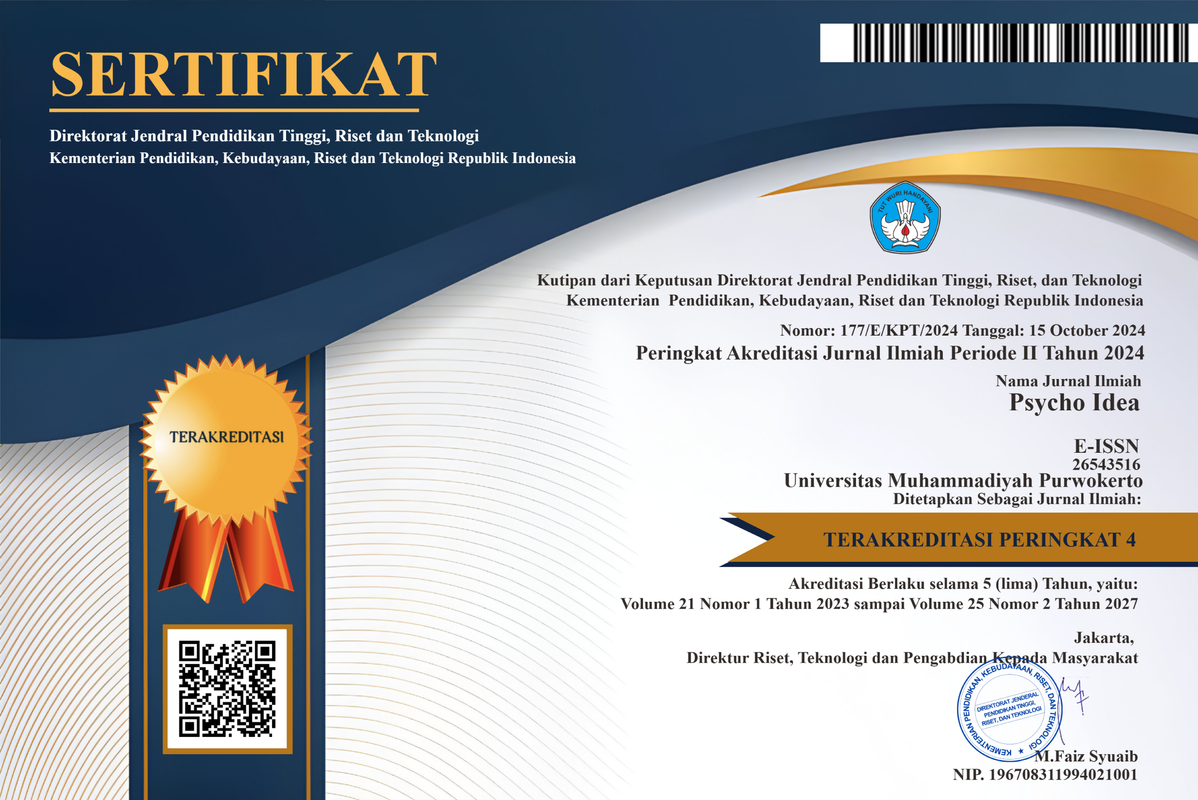IMPLEMENTASI PSIKOLOGI POSITIF DALAM PENGEMBANGAN KEPRIBADIAN MAHASISWA
DOI:
https://doi.org/10.30595/psychoidea.v16i2.3363Abstract
Aliran psikologi positif mencoba memfokuskan perhatian pada upaya menggali dan mengembangkan karakter yang merupakan sisi kekuatan manusia. Dengan menggali dan mengembangkan sisi positif individu akan menghantarkan seseorang pada kebahagiaan yang sesungguhnya dan mampu berfungsi secara optimal dalam kehidupannya, baik sebagai individual, anggota keluarga, anggota masyarakat dan negara. Kehidupan manusia akan bermakna jika sisi positif manusia bisa maksimal dikembangkan. Dengan menerapkan psikologi positif diharapkan dapat membentuk mahasiswa yang berperilaku baik dan mampu berkembang sesuai kompetensi yang dimilikinya. Implementasi psikologi positif diharapkan dapat membentuk pribadi mahasiswa yang dapat mengembangkan sisi positif dalam dirinya, mengembangkan emosi positif dalam berhubungan social dengan orang lain, berpikir positif dalam mengatasi berbagai problem yang dihadapi, memiliki sikap positif dalam belajar dari kesalahan dan pada akhirnya dapat mengintegrasikan seluruh materi kuliah pengembangan kepribadian sesuai dengan hard skill yang diperoleh dari masing-masing jurusan yang diminatinya.
Kata Kunci: Psikologi positif ; Pengembangan Kepribadian Mahasiswa
ABSTRACT
The positive psychology tries to focus attention on the effort to explore and develop the character which is the human strength side. By exploring and developing the individual positive side, will leads a person to truly happiness and will be able to function optimally in his life, not only as individuals, but also family members, society members and the state members. Human life will be meaningful when human positive side can be developedmaximally. By applying positive psychology, expected to form well behaved students and able to develop base on their competence. Implementation positive psychology expected to form a student personality who can develop a positive side in him, develop positive emotions in social relationships with others, positive thinking in overcoming various problems poses a positive attitude in learning from mistakes and finally be able tointegrate personality development lecture’s material based on the hard skills acquired from each department they are interested.
Key words : Positive Psychology; Student Personality Development
References
Ancok. (2007). Pendekatan psikologi positif dalam membangun masyarakat berkualitas
Danner, D., Snowdown, D, & Friesen, W. (2001). Positive emotion in early life and longevity. Journal of Personality and Social Psychology, 80,804-813
Frohh, J. (2004), The History of Positive Psychology: Truth be told. NYS Psychologist
Gillman, Rich, Huebner, E.Scott& Furlong, Michael J (editors). 2009. Handbook of Positive Psychology in School. Oxon : Taylor & Francis
Haidt, J. (2000). The Positive emotion of elevation, Prevention & Treatment. New York: Free Press
Hartadi, B. (2007). Membangun pribadi unggul, sukses dan dinamis. Yogyakarta: UTY Press
Isen, A.M. (1993). Hand Book of Emotions. New York: Guilford Press
Seligman, M. E.P & Csikszentmihalyi, Mihaly. (2000).Positive Psychology : An Introduction. American Psychology Association, 55 (1), 5-14.
Seligman, M. (2002). Authentic Happiness. Menciptakan Kebahagiaan dengan Psikologi Positif. (Terjemahan), Bandung: Mizan
Seligman, M. (2006). Hand Book of Positive Psychology. London: Oxford University Press
Taylor, S.E. (2000). Psychological resources, positive illusions and health. American Psychologist, 55, 99-109
Downloads
Published
Issue
Section
License
Authors published in this journal agree to the following terms:
- The copyright of each article is retained by the author (s) without restrictions
- The journal allows the author(s) to retain publishing rights without restrictions
- The author grants the journal the first publication rights with the work simultaneously licensed under the Creative Commons Attribution License, allowing others to share the work with an acknowledgment of authorship and the initial publication in this journal.
- Authors may enter into separate additional contractual agreements for the non-exclusive distribution of published journal versions of the work (for example, posting them to institutional repositories or publishing them in a book), with acknowledgment of their initial publication in this journal
- Authors are permitted and encouraged to post their work online (For example in the Institutional Repository or on their website) before and during the submission process, as this can lead to productive exchanges, as well as earlier and larger citations of published work
- Articles and all related material published are distributed under a Creative Commons Attribution-4.0 International Public License (CC - BY 4.0).
License
Psycho Idea is licensed under a Creative Commons Attribution- 4.0 International Public License (CC - BY 4.0).
You are free to :
Share — copy and redistribute the material in any medium or format
Adapt — remix, transform, and build upon the material for any purpose, even commercially











